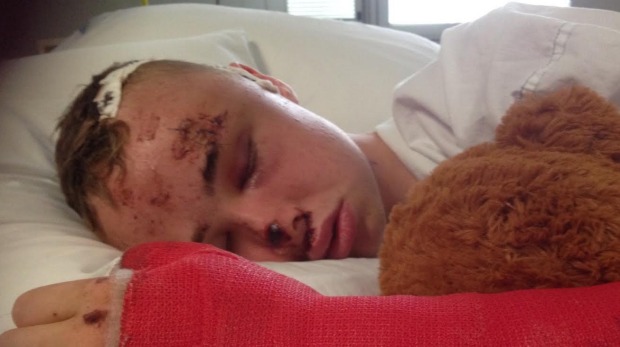
A teenage boy with a critical brain injury was blocked access to the Sydney Children’s Hospital for four days because there were not enough beds, his family was told.
Scott Baker, 14, was stranded in the intensive care unit at Canberra Hospital, which has no specialist paediatric neurosurgery staff or services, following a skateboard accident at his Queanbeyan home on Sunday.
It does highlight that there’s an issue with capacity in our paediatric hospitals.AMA President Brian Owler
He was admitted as an urgent priority case and all other surgical procedures at the hospital were put off while he was given an emergency craniotomy.
But after the operation, despite efforts by the medical staff in Canberra to transfer him to Randwick where there is a paediatric acute brain injury service, the Sydney Children’s Hospital network refused to accept him.
Transport was finally organised on Wednesday following lobbying by the family, and he was to be flown to Sydney by helicopter on Thursday morning.
Father Jamie Baker said it was not clear what the long-term outcome would be for his son, who was already suffering from seizures and complications relating to a previous brain injury at the age of seven.
“We have a very complex child who needs complex care in the right environment and we can’t access it,” Mr Baker said.
“The whole of Canberra Hospital had to close its theatres to treat him.
“How sick do you have to be to access a public service in your home state?”
A spokeswoman for the Sydney Children’s Hospital said the hospital had been unable to accept the patient as it was caring for a particularly high number of seriously unwell neurology patients.
“SCH receives inter-hospital patient transfer requests on a daily basis, and assesses, triages and admits patients based on their clinical urgency,” she said.
“This assessment is made in close consultation with the referring hospital’s clinical team and is reviewed on a regular basis.”
Australian Medical Association president Brian Owler, who is a neurosurgeon, said a 14-year-old patient was physiologically similar to an adult patient and the neurosurgeons at Canberra Hospital would have been well placed to treat him.
“It does highlight that there’s an issue with capacity in our paediatric hospitals, both at Westmead and the Sydney Children’s Hospital, which are in the same network,” Associate Professor Owler said.
“We know that cases are not infrequently cancelled because of ICU requirements.”
An ACT Health spokeswoman said Canberra Hospital had prioritised Scott’s needs while a bed was being organised in Sydney.
“The transfer to Sydney is very important in terms of ongoing clinical management and rehabilitation for this NSW patient,” she said.
